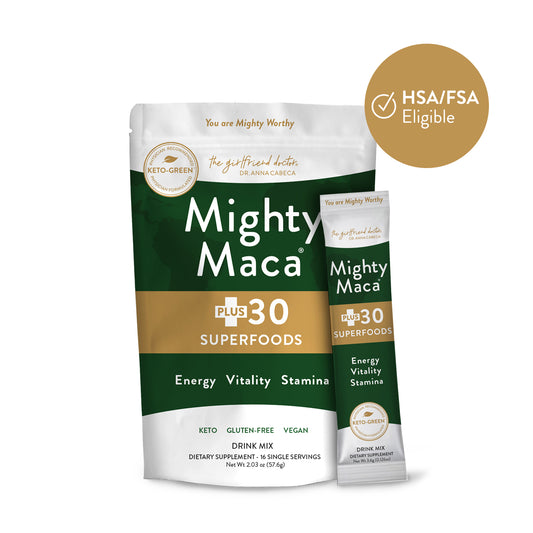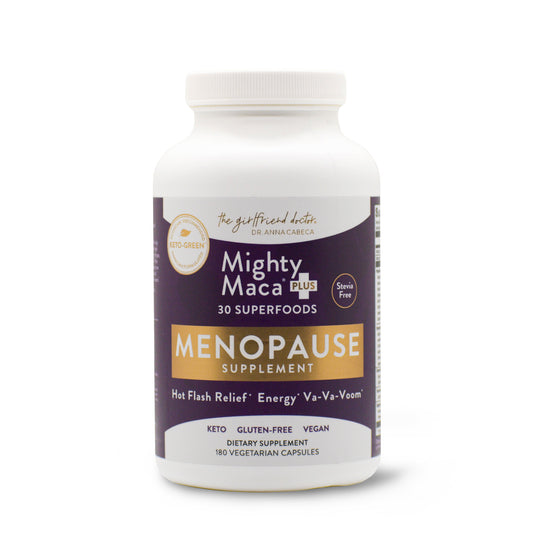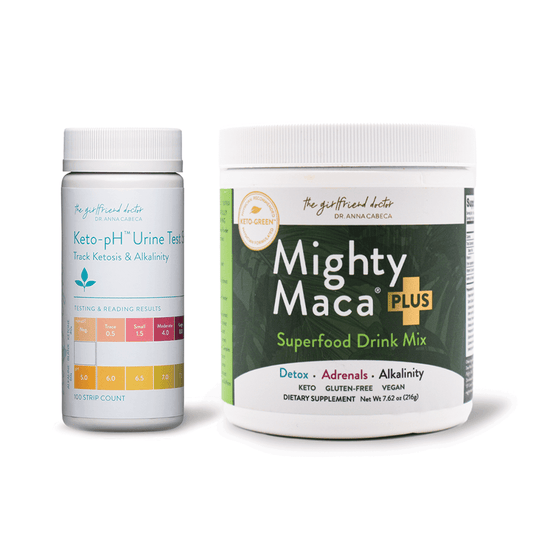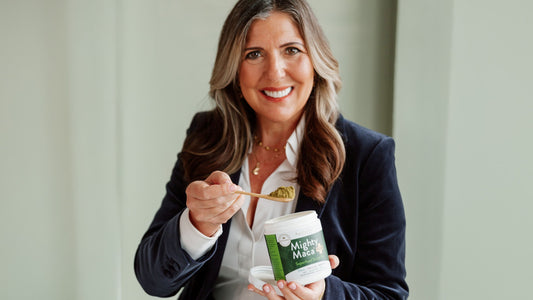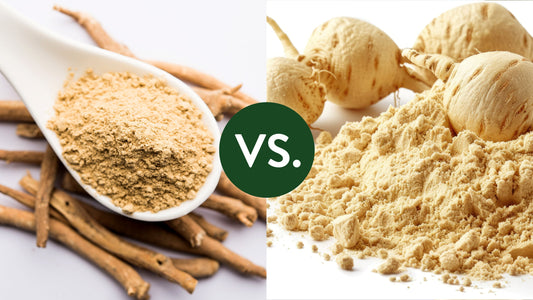Perimenopause can come on quickly. Your progesterone drops like an extremely hot potato and all of a sudden, you’re dealing with mood issues, sleep troubles, low energy, headaches, hot flashes, the whole shebang. Intervening as early as possible can help ease this transition — so it’s important to take action the minute you notice something’s off.
As a triple-board certified OB-GYN, I get asked all the time what supplements I’d consider the best for perimenopause…so I’ve outlined them all here for you in one place.
In this article, you will learn:
- How supplements can help balance hormones and knock out perimenopausal symptoms.
- The best supplements I recommend for supporting mood, sleep, and energy.
- Tips on selecting high-quality, safe supplements to ensure optimal results.
Let's dive into understanding perimenopause and why early intervention is essential.

Maybe you’ve got a sneaking suspicion your hormones are starting to take a turn for the worse. But you’re not sure exactly what’s going on.
Be sure to take my perimenopause symptoms quiz here to help determine what’s going on. It’s free and it’s fun!
Some of the early signs of perimenopause go either unnoticed, or we chalk them up to other medical conditions.

All of these types of changes can be mistaken for a whole host of other issues.
This isn’t the exhaustive list of perimenopause symptoms, either.
Here’s a more thorough rundown:
- Hair loss
- Fatigue
- Nausea
- Cramps (sometimes described as ovary pain)
- Spotting(sometimes noticed when wiping)
- Itching
- Bloating
- Breast pain
- Heavy bleeding
- Heart palpitations
- Itchy skin
- Discharge
- Dizziness
- Hip pain
- Vaginal itching
- Jittery feeling
- Weight gain
- Acne
- Joint pain
- Brain fog
Why Early Intervention Is Important
Most women, when they start to notice these symptoms, brush them off. They power through and keep on going — until they can’t anymore.
I’d like to argue for early intervention, especially using natural methods. Addressing these symptoms head-on and quickly is crucial for maintaining your quality of life. Early intervention can prevent symptoms from escalating and affecting everyday activities, work, and relationships.
And, what’s really important is managing these symptoms quickly can help support long-term health, particularly in areas like bone density, cardiovascular health, and mental well-being. By recognizing the signs early and seeking solutions, (yes, including some perimenopause supplements) you can better navigate this transitional phase and set yourself up for long-term benefits.
Benefits of Using Supplements for Perimenopause
Supplements can be a gentle yet effective way to support your body through the changes of perimenopause, helping to restore balance and enhance quality of life. They can help symptoms become less intense (or in some cases, disappear!)
But they can also help fortify your body, preparing it for what’s to come. When you’re in the early stages of perimenopause you can use supplements to shore up your overall health and help stop the march of things like osteoporosis, heart disease, and diabetes — all things that become much more common during menopause.
Best Hormone-Balancing Supplements For Perimenopause
It’s important to note that supplements are most effective when part of a holistic approach.
In fact, I’d say that the best hormone-balancing supplements for perimenopause are diet, exercise, and stress management. Of course, all of these things are easier to accomplish when your supplement stack is supporting you physiologically…but everything should work in tandem.
In other words, supplements can fill nutritional gaps and provide relief, but they work best alongside other strategies that support overall health. And as always, consulting with a healthcare provider ensures that the right combination of supplements and lifestyle changes is tailored to your unique needs during perimenopause.
1. Topical Progesterone
Topical progesterone cream is one of the biggest needle-movers when it comes to perimenopause. That’s because progesterone is the first hormone that starts to dip. Progesterone is only produced in abundance by the body after you ovulate — and in perimenopause, we often start to see anovulatory cycles.
That means you’re still having a menstrual cycle, but an egg isn’t actually getting released during the process. So you have the normal fluctuations and rise of estrogen, without ample amounts of progesterone around to oppose the excess estrogen. This is why you often see mood symptoms, hot flashes, and trouble sleeping during perimenopause. It’s the lack of progesterone.
My Balance formula is a gentle topical progesterone cream that also includes pregnenolone (which is the ‘mother’ hormone your body uses to make sex hormones) and luxury skincare ingredients so it’s the ideal perimenopause partner. Just use it as a night cream on your face so you can sleep like a boss.
2. Vaginal DHEA (Dehydroepiandrosterone)
DHEA is a hormone that your body turns into other sex hormones, including estrogen, progesterone, and testosterone. When you apply it locally to thin, itchy, and dry vaginal tissues — it helps support moisture in a way you cannot believe. Plus, it helps to rev up the libido so you can restore your love life.
My patented Julva® cream includes powerful moisturizers and DHEA for fast perimenopause support. Just a quick, easy application of this formula makes you feel like a whole new woman down there.
3. Vitamin D
Bone health becomes a major concern during menopause as estrogen levels drop, which increases the risk of bone density loss. (1)
Starting a Vitamin D supplement now can support bone health later, which is crucial for preventing conditions like osteoporosis.
I always recommend combining vitamin D3 with K2 because K2 can help facilitate calcium getting into your bones effectively. My Ray of Strength supplement provides the ideal ratio of both.
4. Magnesium
Magnesium plays a vital role in over 300 chemical reactions in your body, including muscle relaxation, mood regulation, and brain health.
Magnesium is one of the most overlooked supplements for women in perimenopause, because so many of us are deficient or have suboptimal levels. (2,3)
A lot of times, when you start taking a high-quality magnesium supplement, it helps clear up so much of the struggle — especially when you’re trying to get to sleep.
Magnesium also supports heart health and may help your mood, too. Again, it’s one of those supplements you can start taking now that will pay off in spades later.
5. Omega-3 Fatty Acids
Omega-3s, found in fish oil or flaxseed oil supplements, are known for their anti-inflammatory properties. (4)
They support heart health, which is important as the risk of cardiovascular disease can increase during menopause. (5) Omega-3s can support mood and cognitive function as well. They are fantastic all around, full-body support — especially if you don’t eat tons of cold water fatty fish.
When you’re shopping for an Omega supplement, it’s important to make sure you find one that’s easily absorbed and not full of contaminants, like my Omega Goodness formula. It supports your body in so many ways — without the yucky fish burps ;)
6. Adaptogens
I am such a huge fan of adaptogens because they are natural substances that help the body adapt to stress. During perimenopause, they support your adrenals — which means they help you have more energy and better hormone balance.
I love using adaptogens during perimenopause and on into menopause because they are especially useful for supporting mood swings, fatigue, and hot flashes.
My Mighty Maca® Plus drink mix combines the power of adaptogens with dozens of superfoods to give you the ultimate boost in peri and beyond. Thousands of women use this formula every day to battle hot flashes and boost energy. It’s the ultimate morning or afternoon pick-me-up!
7. Probiotics
Gut health plays a significant role in hormone regulation because your excess hormones are packaged up and sent out through your digestive tract. Plus, you have a whole entire portion of your gut microbiome that’s in charge of regulating your hormones, called the estrobolome.
When you treat your gut properly in perimenopause, it can help with digestion, absorption of essential nutrients, and so much more. And probiotics can help support a healthy weight, mood, and immune system during perimenopause.
Check out my favorite probiotic here.
Natural Supplements For Perimenopause
Ultimately, it’s best to approach perimenopause holistically, by combining a targeted supplement regimen that supports your body with diet, exercise, and stress management.
With this well-rounded course of action, you can fortify your body for what’s coming and enjoy a much smoother menopausal transition.
Because while menopause is mandatory, suffering is optional!








